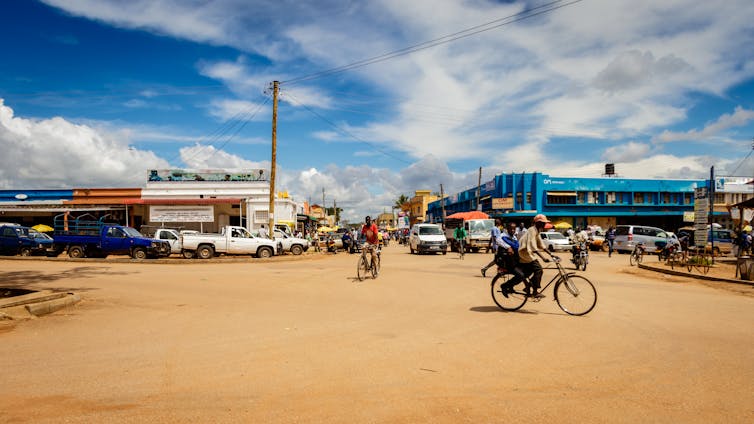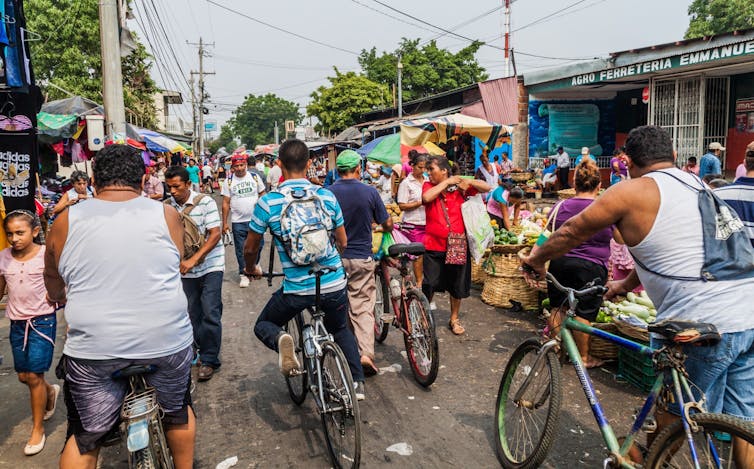[ad_1]
Globe Bicycle Working day is celebrated on June 3 in guidance of the strategy that bicycles “contribute to cleaner air and a lot less congestion and helps make education and learning, wellness care and other social providers additional accessible to the most vulnerable populations.”
The bicycle performs a enormous part in bodily action. This was particularly evident for the duration of the pandemic, as bicycle purchases skyrocketed. Amid lockdown steps, cycling remained a crucial option to community transportation, even though featuring the profit of outside and socially distanced physical action. But even prior to the pandemic started, people’s curiosity in bikes was increasing.
Cycling could be the respond to to far more than just our physical action and pandemic woes. It could provide community officers a way to handle convergent crises in community overall health, transportation and weather. At the identical time, enhanced bicycle use can create new economic possibilities, like offering very low-price bicycles for sustainable transport and mechanical teaching to regional communities to produce positions.
And as gas prices continue to increase due to the ongoing invasion of Ukraine, governments are urging citizens to think about the bicycle. What’s crystal clear is that the bicycle’s potential to respond to urgent social concerns has impressed both equally intrigue and optimism, especially in the context of COVID-19.
Bicycles for progress
We are a group of researchers fascinated in the social and environmental proportions of activity, physical action and overall health with a emphasis — for the function described below — on the perceived function of growth in the emergent cycling increase.
So far our investigation has attempted to map out the bicycles for improvement motion, which considers the bicycle a highly effective technological know-how that retains noteworthy implications for social alter and progress objectives.

(Shutterstock)
Our research demonstrates that this movement is driven largely by the operate of non-governmental organizations offering bicycles to communities across the world.
These initiatives can be solely nearby, though they typically cross global lines — companies amassing utilized bicycles in one put often ship them in other places. Bicycles that are delivered to communities generally come from donations, micro-funding initiatives or social entrepreneurial ventures, like those led by ladies in rural Uganda.
In excess of the earlier six decades our analysis in Canada, Nicaragua and Uganda has highlighted crucial methods that bicycles for improvement initiatives feel to have good consequences. For example, bicycle accessibility can foster mobility, which can direct to several chances (like accessing academic opportunities and neighborhood marketplaces to promote merchandise), and could aid advertise a sense of social inclusion or economic growth.
Generating a short-term resolution
In Canada, we performed analysis with communities in Toronto and Vancouver. Our research in Toronto showed how bicycles are becoming taken up by mutual help businesses to react to escalating food insecurity all through the pandemic. Through focusing on the ordeals of 2SLGBTQ+ and racialized cyclists, we highlighted the ways in which numerous cyclists obstacle programs of racialized and gendered oppression employing the bicycle to dismantle stereotypes about who can take part in biking.
Nonetheless, even though the bicycle has good opportunity, our investigation also demonstrated that furnishing bicycles to ladies and women is, in some strategies, crammed with tensions and issues. For instance, in our most the latest analysis in Uganda, some ladies defined that prior to obtaining the bicycle, they ended up generally responsible for caregiving and other domestic jobs like cooking.
On acquiring the bicycle, they now also have to engage in economic routines — that means extra labour-centered expectations for females in rural communities. This frequently potential customers to an extension of existing inequalities concerning guys and women.
There was also a worry in excess of the quality of bicycles donated. For instance some of the bicycles donated essential certain unavailable spare pieces that means they have been of very little use when they broke down. But applications like Planet Bicycle Relief’s “Buffalo Bicycle” are geared toward addressing this difficulty.

(Shutterstock)
The actuality that bicycle-pushed assist could have unintended and in some cases detrimental implications aligns with a prosperity of study in the activity for advancement industry, and in growth scientific studies a lot more broadly.
We refer to these unintended destructive outcomes of progress-focused interventions as forms of “ironic activism.”
When our exploration exposed the optimistic potential of bicycle entry, our conclusions also steered us in other instructions: bicycles may well empower people and communities but they might also replicate or exacerbate current issues and inequalities. Bicycle-centered enhancement plans can have equally intended and unintended effects.
Even though the optimism for Globe Bicycle Working day is welcome, it is important to don’t forget that with all of their prospective, bicycles cannot resolve our overlapping modern crises on their individual.
Janet Otte, Patrick Eyul and Lidieth del Soccorro Cruz Centeno co-authored this article. Janet has knowledge managing advancement tasks on refugees, women’s rights and medical exploration in Uganda. Patrick is a social scientist who performs with improvement and study organizations in Uganda. Lidieth is the director of the Asociación Movimiento de Jóvenes de Ometepe in Nicaragua.
[ad_2]
Supply website link




More Stories
Cultivating Skills All Students Need to Thrive  – Dr. Catlin Tucker
Gagliano tapped as Newberry College’s interim dean of arts, humanities & social sciences
Developing Psychological Citizens with Dr. Fathali Moghaddam